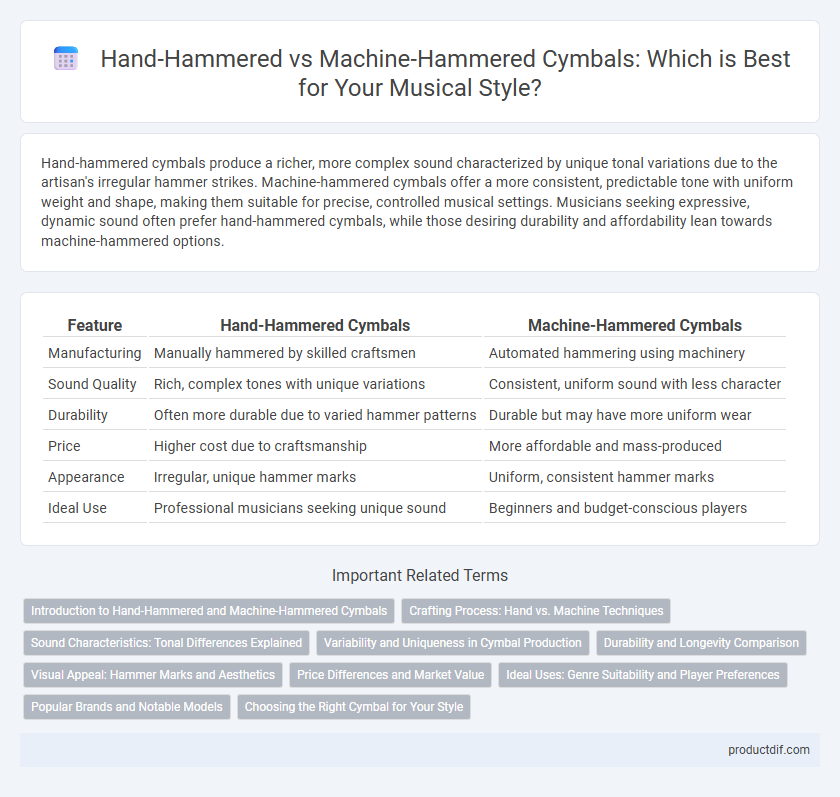Hand-hammered cymbals produce a richer, more complex sound characterized by unique tonal variations due to the artisan's irregular hammer strikes. Machine-hammered cymbals offer a more consistent, predictable tone with uniform weight and shape, making them suitable for precise, controlled musical settings. Musicians seeking expressive, dynamic sound often prefer hand-hammered cymbals, while those desiring durability and affordability lean towards machine-hammered options.
Table of Comparison
| Feature | Hand-Hammered Cymbals | Machine-Hammered Cymbals |
|---|---|---|
| Manufacturing | Manually hammered by skilled craftsmen | Automated hammering using machinery |
| Sound Quality | Rich, complex tones with unique variations | Consistent, uniform sound with less character |
| Durability | Often more durable due to varied hammer patterns | Durable but may have more uniform wear |
| Price | Higher cost due to craftsmanship | More affordable and mass-produced |
| Appearance | Irregular, unique hammer marks | Uniform, consistent hammer marks |
| Ideal Use | Professional musicians seeking unique sound | Beginners and budget-conscious players |
Introduction to Hand-Hammered and Machine-Hammered Cymbals
Hand-hammered cymbals are crafted by skilled artisans who shape each cymbal manually using hammers, resulting in unique tonal characteristics and subtle variations in sound. Machine-hammered cymbals, produced through automated processes, exhibit more consistent patterns and predictable sound profiles suited for precise musical settings. The choice between hand-hammered and machine-hammered cymbals significantly influences the instrument's tonal complexity, volume, and resonance in various musical genres.
Crafting Process: Hand vs. Machine Techniques
Hand-hammered cymbals showcase unique tonal characteristics achieved through skilled artisans striking the metal with precision, creating irregular hammer marks that influence sound complexity. Machine-hammered cymbals utilize automated processes to deliver consistent patterns and uniform thickness, producing more predictable and controlled tones. The crafting process directly impacts the cymbal's acoustic properties, with hand hammering fostering rich, dark sounds and machine techniques favoring brighter, sharper accents.
Sound Characteristics: Tonal Differences Explained
Hand-hammered cymbals produce complex, rich tones with dynamic overtones and a natural, warm resonance due to the irregular hammering patterns created by skilled artisans. Machine-hammered cymbals, on the other hand, tend to offer more consistent, brighter sounds with less tonal variation, as the precise, repetitive hammering limits the development of unique sonic textures. Drummers often prefer hand-hammered cymbals for jazz and orchestral music where nuanced expression is critical, while machine-hammered models are favored in genres requiring sharp attack and uniformity.
Variability and Uniqueness in Cymbal Production
Hand-hammered cymbals exhibit greater variability and uniqueness due to the artisan's individual touch, resulting in distinct tonal characteristics and a richer sound spectrum with subtle imperfections. Machine-hammered cymbals, by contrast, offer consistency and uniformity across each piece, producing predictable sound quality ideal for mass production. This difference in production methods directly influences the cymbal's resonance, sustain, and overall musical expression.
Durability and Longevity Comparison
Hand-hammered cymbals exhibit superior durability due to their thicker, denser metal construction and intricate hammering techniques that enhance structural integrity. Machine-hammered cymbals offer consistent thickness and uniformity but may be more prone to cracking over extended use due to less nuanced metal tension distribution. Longevity of hand-hammered cymbals often surpasses machine-hammered counterparts, making them favored by professional drummers seeking lasting performance and tonal richness.
Visual Appeal: Hammer Marks and Aesthetics
Hand-hammered cymbals feature irregular, deep hammer marks that create a unique, organic texture visible on their surface, enhancing their artisanal aesthetic. Machine-hammered cymbals display uniform, shallow indentations arranged in precise patterns, resulting in a more polished and consistent finish. The distinctive hammer marks on hand-hammered cymbals often attract musicians seeking a traditional, handcrafted look, while machine-hammered options appeal to those preferring sleek, modern visuals.
Price Differences and Market Value
Hand-hammered cymbals typically command higher prices due to their artisanal craftsmanship and unique tonal qualities, often favored by professional drummers and collectors. Machine-hammered cymbals offer more consistent production and affordability, making them popular among beginners and budget-conscious musicians. The market value of hand-hammered cymbals remains strong because of their rarity and superior sound, whereas machine-hammered cymbals depreciate faster due to mass production.
Ideal Uses: Genre Suitability and Player Preferences
Hand-hammered cymbals offer complex, dark tones favored in jazz, fusion, and orchestral music, appealing to drummers seeking nuanced, expressive sound profiles. Machine-hammered cymbals produce brighter, more consistent tones preferred in rock, pop, and marching band settings for their durability and predictability. Player preferences hinge on desired sound texture and genre-specific requirements, with hand-hammered suited for dynamic playing and machine-hammered for volume and projection.
Popular Brands and Notable Models
Zildjian and Sabian are leading brands known for their hand-hammered cymbals such as the Zildjian K Custom and Sabian HHX series, prized for their rich, complex tones. Meinl and Paiste feature prominent machine-hammered models like the Meinl MB20 and Paiste PST 7, favored for their consistency and bright, cutting sound. Musicians often choose based on tonal preference, with hand-hammered cymbals offering organic variation and machine-hammered cymbals delivering precision and durability.
Choosing the Right Cymbal for Your Style
Hand-hammered cymbals offer a complex, rich tone with nuanced overtones ideal for jazz and blues musicians seeking warmth and character. Machine-hammered cymbals provide consistency and brighter sounds suited for rock and pop genres requiring durability and punch. Selecting the right cymbal depends on your playing style, desired sound texture, and genre-specific requirements for performance.
Hand-hammered cymbals vs Machine-hammered cymbals Infographic

 productdif.com
productdif.com